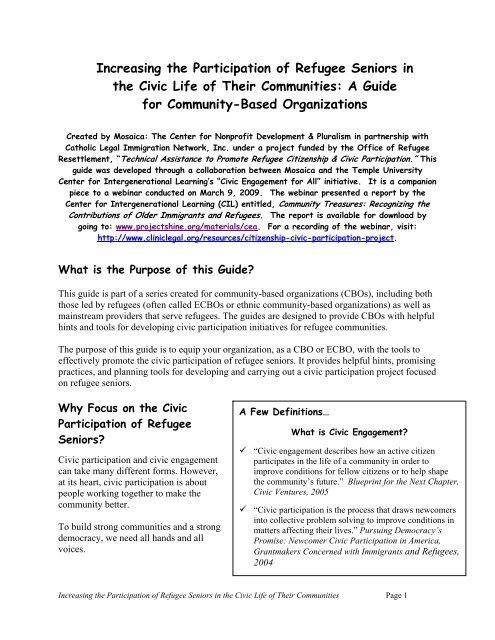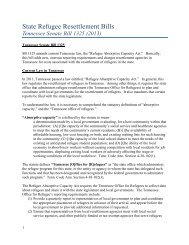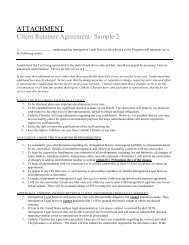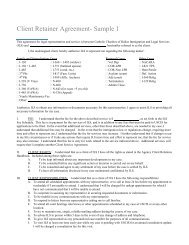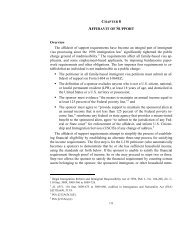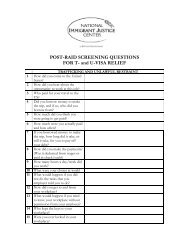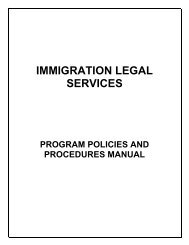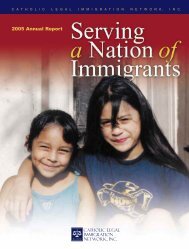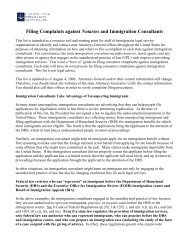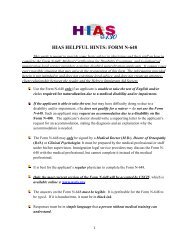Increasing the Participation of Refugee Seniors in the Civic Life of ...
Increasing the Participation of Refugee Seniors in the Civic Life of ...
Increasing the Participation of Refugee Seniors in the Civic Life of ...
You also want an ePaper? Increase the reach of your titles
YUMPU automatically turns print PDFs into web optimized ePapers that Google loves.
<strong>Increas<strong>in</strong>g</strong> <strong>the</strong> <strong>Participation</strong> <strong>of</strong> <strong>Refugee</strong> <strong>Seniors</strong> <strong>in</strong><strong>the</strong> <strong>Civic</strong> <strong>Life</strong> <strong>of</strong> Their Communities: A Guidefor Community-Based OrganizationsCreated by Mosaica: The Center for Nonpr<strong>of</strong>it Development & Pluralism <strong>in</strong> partnership withCatholic Legal Immigration Network, Inc. under a project funded by <strong>the</strong> Office <strong>of</strong> <strong>Refugee</strong>Resettlement, “Technical Assistance to Promote <strong>Refugee</strong> Citizenship & <strong>Civic</strong> <strong>Participation</strong>.” Thisguide was developed through a collaboration between Mosaica and <strong>the</strong> Temple UniversityCenter for Intergenerational Learn<strong>in</strong>g’s “<strong>Civic</strong> Engagement for All” <strong>in</strong>itiative. It is a companionpiece to a web<strong>in</strong>ar conducted on March 9, 2009. The web<strong>in</strong>ar presented a report by <strong>the</strong>Center for Intergenerational Learn<strong>in</strong>g (CIL) entitled, Community Treasures: Recogniz<strong>in</strong>g <strong>the</strong>Contributions <strong>of</strong> Older Immigrants and <strong>Refugee</strong>s. The report is available for download bygo<strong>in</strong>g to: www.projectsh<strong>in</strong>e.org/materials/cea. For a record<strong>in</strong>g <strong>of</strong> <strong>the</strong> web<strong>in</strong>ar, visit:http://www.cl<strong>in</strong>iclegal.org/resources/citizenship-civic-participation-project.What is <strong>the</strong> Purpose <strong>of</strong> this Guide?This guide is part <strong>of</strong> a series created for community-based organizations (CBOs), <strong>in</strong>clud<strong>in</strong>g boththose led by refugees (<strong>of</strong>ten called ECBOs or ethnic community-based organizations) as well asma<strong>in</strong>stream providers that serve refugees. The guides are designed to provide CBOs with helpfulh<strong>in</strong>ts and tools for develop<strong>in</strong>g civic participation <strong>in</strong>itiatives for refugee communities.The purpose <strong>of</strong> this guide is to equip your organization, as a CBO or ECBO, with <strong>the</strong> tools toeffectively promote <strong>the</strong> civic participation <strong>of</strong> refugee seniors. It provides helpful h<strong>in</strong>ts, promis<strong>in</strong>gpractices, and plann<strong>in</strong>g tools for develop<strong>in</strong>g and carry<strong>in</strong>g out a civic participation project focusedon refugee seniors.Why Focus on <strong>the</strong> <strong>Civic</strong><strong>Participation</strong> <strong>of</strong> <strong>Refugee</strong><strong>Seniors</strong>?<strong>Civic</strong> participation and civic engagementcan take many different forms. However,at its heart, civic participation is aboutpeople work<strong>in</strong>g toge<strong>the</strong>r to make <strong>the</strong>community better.To build strong communities and a strongdemocracy, we need all hands and allvoices.A Few Def<strong>in</strong>itions…What is <strong>Civic</strong> Engagement? “<strong>Civic</strong> engagement describes how an active citizenparticipates <strong>in</strong> <strong>the</strong> life <strong>of</strong> a community <strong>in</strong> order toimprove conditions for fellow citizens or to help shape<strong>the</strong> community’s future.” Bluepr<strong>in</strong>t for <strong>the</strong> Next Chapter,<strong>Civic</strong> Ventures, 2005 “<strong>Civic</strong> participation is <strong>the</strong> process that draws newcomers<strong>in</strong>to collective problem solv<strong>in</strong>g to improve conditions <strong>in</strong>matters affect<strong>in</strong>g <strong>the</strong>ir lives.” Pursu<strong>in</strong>g Democracy’sPromise: Newcomer <strong>Civic</strong> <strong>Participation</strong> <strong>in</strong> America,Grantmakers Concerned with Immigrants and <strong>Refugee</strong>s,2004<strong>Increas<strong>in</strong>g</strong> <strong>the</strong> <strong>Participation</strong> <strong>of</strong> <strong>Refugee</strong> <strong>Seniors</strong> <strong>in</strong> <strong>the</strong> <strong>Civic</strong> <strong>Life</strong> <strong>of</strong> Their Communities Page 1
As <strong>the</strong> CIL report suggests, refugee seniors are “community treasures.” Like o<strong>the</strong>r seniors, <strong>the</strong>yhave a wealth <strong>of</strong> knowledge and experience to <strong>of</strong>fer, and <strong>the</strong> same human desires we all share t<strong>of</strong>eel useful and give back to o<strong>the</strong>rs.In <strong>the</strong>ir home countries, refugee elders typically held important positions and played importantroles <strong>in</strong> community life and decision mak<strong>in</strong>g. Yet once <strong>in</strong> <strong>the</strong> United States, <strong>the</strong> process <strong>of</strong>resettlement and <strong>in</strong>tegration too <strong>of</strong>tenerodes and neglects those roles. As aresult, refugee seniors <strong>of</strong>ten experience Helpful H<strong>in</strong>t…isolation and even depression when <strong>the</strong>yWhat Does <strong>Civic</strong> <strong>Participation</strong> Look Like?lose a sense <strong>of</strong> purpose and status.How can we help refugee elders “apply”<strong>the</strong> knowledge and experience <strong>the</strong>y have<strong>in</strong> this new environment?<strong>Refugee</strong> seniors can be <strong>in</strong>volved <strong>in</strong> andgive back to both <strong>the</strong> refugee communityand <strong>the</strong> broader neighborhoods and cities<strong>in</strong> which <strong>the</strong>y live. They can be <strong>in</strong>volved<strong>in</strong> a variety <strong>of</strong> ways, both formal and<strong>in</strong>formal. Community Treasures identifiesfive ma<strong>in</strong> forms <strong>of</strong> civic <strong>in</strong>volvement forrefugee seniors: help<strong>in</strong>g, participat<strong>in</strong>g,giv<strong>in</strong>g, <strong>in</strong>fluenc<strong>in</strong>g, and lead<strong>in</strong>g (seeCommunity Treasures, page 16).If refugees get <strong>in</strong>volved <strong>in</strong> any <strong>of</strong> <strong>the</strong> follow<strong>in</strong>g k<strong>in</strong>ds <strong>of</strong>activities, that’s civic participation! Organiz<strong>in</strong>g or participat<strong>in</strong>g <strong>in</strong> neighborhood meet<strong>in</strong>gs,clean-ups, or cultural festivals Volunteer<strong>in</strong>g with a community-based organization,church, temple, or mosque Attend<strong>in</strong>g city council meet<strong>in</strong>gs or giv<strong>in</strong>g testimony atpublic hear<strong>in</strong>gs Participat<strong>in</strong>g <strong>in</strong> meet<strong>in</strong>gs or forums to discuss communityissues Speak<strong>in</strong>g with ma<strong>in</strong>stream groups to educate <strong>the</strong>m aboutrefugees Writ<strong>in</strong>g letters to <strong>the</strong> editor <strong>of</strong> a newspaper Tak<strong>in</strong>g part <strong>in</strong> rallies, marches, or vigils Vot<strong>in</strong>gThere are many th<strong>in</strong>gs that CBOs can doto help restore and streng<strong>the</strong>n traditional civic roles with<strong>in</strong> <strong>the</strong> community, and to remove <strong>the</strong>barriers to participation <strong>in</strong> <strong>the</strong> civic life <strong>of</strong> <strong>the</strong> broader community. <strong>Refugee</strong> seniors have much to<strong>of</strong>fer <strong>in</strong> both realms. Their participation benefits <strong>the</strong> health and well be<strong>in</strong>g <strong>of</strong> both refugee elders<strong>the</strong>mselves as well as <strong>the</strong> communities <strong>in</strong> which <strong>the</strong>y live.More Information…<strong>Civic</strong> Engagement and Older AmericansIn <strong>the</strong> past, societal attitudes about ag<strong>in</strong>g were a barrier to foster<strong>in</strong>g widespread<strong>in</strong>volvement and leadership <strong>of</strong> seniors <strong>in</strong> <strong>the</strong> civic life <strong>of</strong> <strong>the</strong> United States.However, <strong>the</strong>se attitudes have changed <strong>in</strong> recent years as members <strong>of</strong> <strong>the</strong> “baby boom”generation enter <strong>the</strong>ir senior years. Work<strong>in</strong>g <strong>in</strong> partnership with advocates, researchers,and nonpr<strong>of</strong>it organizations, government agencies at all levels are tak<strong>in</strong>g steps to promoteand support civic engagement among older Americans.<strong>Increas<strong>in</strong>g</strong> <strong>the</strong> <strong>Participation</strong> <strong>of</strong> <strong>Refugee</strong> <strong>Seniors</strong> <strong>in</strong> <strong>the</strong> <strong>Civic</strong> <strong>Life</strong> <strong>of</strong> Their Communities Page 2
What are <strong>the</strong> Benefits and Challenges to Involv<strong>in</strong>g <strong>Refugee</strong> Elders<strong>in</strong> <strong>Civic</strong> <strong>Participation</strong>?Promot<strong>in</strong>g civic participation among refugee elders will benefit <strong>the</strong> elders <strong>the</strong>mselves, yourorganization, and <strong>the</strong> wider community.For engaged elders, <strong>the</strong> benefits <strong>of</strong> senior civic participation can <strong>in</strong>clude: Decreased isolation and improved health. <strong>Civic</strong> participation can provideopportunities for social connections, as well as productive and mean<strong>in</strong>gful activities.Many studies have a shown a positive relationship between community service and healthfor older Americans. Greater access to o<strong>the</strong>r resources. <strong>Civic</strong> participation can be a vehicle for tapp<strong>in</strong>g<strong>in</strong>to wider organizational and community resources. By gett<strong>in</strong>g <strong>in</strong>volved, seniors canlearn about and make connections to resources – from libraries to health programs – thatcan improve <strong>the</strong>ir well-be<strong>in</strong>g. Restored sense <strong>of</strong> self-worth. <strong>Civic</strong> participation can restore <strong>the</strong> self-confidencethat is <strong>of</strong>ten eroded with <strong>the</strong> loss <strong>of</strong> traditional leadership roles. In addition, it cantransform <strong>in</strong>formal helpers and leaders to publically-recognized leaders.For your organization, <strong>the</strong> benefits <strong>of</strong> efforts to engage refugee elders <strong>in</strong> civic participation can<strong>in</strong>clude: Increased staff knowledge and understand<strong>in</strong>g <strong>of</strong> senior issues andstrengths. By focus<strong>in</strong>g on a civic participation effort, staff will be able to learn moreabout senior issues, <strong>in</strong>terests, and strengths. This will help <strong>the</strong>m better serve and workwith older members <strong>of</strong> <strong>the</strong> community. Deeper relationships with seniors. A civic participation focus will help staff developand nurture an au<strong>the</strong>ntic partnership with elder leaders. Increased credibility. Deeper relationships with elders can enhance yourorganization’s credibility with<strong>in</strong> <strong>the</strong> community. Greater collaboration with <strong>the</strong> community. <strong>Civic</strong> participation shifts <strong>the</strong> focus from“What services do you need?” to “How can we all be <strong>in</strong>volved <strong>in</strong> mak<strong>in</strong>g <strong>the</strong> communitybetter?” Therefore, it fosters collaboration and can provide an opportunity for staff towork toge<strong>the</strong>r with community members on common causes and issues.For <strong>the</strong> community as a whole, <strong>the</strong> benefits <strong>of</strong> elder civic participation can <strong>in</strong>clude: New ideas and skills that can be tapped to address community needs and problems. Additional volunteers for organization and community events and activities. More advocates on issues affect<strong>in</strong>g seniors and <strong>the</strong> community as a whole.<strong>Increas<strong>in</strong>g</strong> <strong>the</strong> <strong>Participation</strong> <strong>of</strong> <strong>Refugee</strong> <strong>Seniors</strong> <strong>in</strong> <strong>the</strong> <strong>Civic</strong> <strong>Life</strong> <strong>of</strong> Their Communities Page 3
Provides services to families with elder relatives at home, <strong>the</strong>n you could reach out tothose families to <strong>in</strong>vite elder members <strong>of</strong> <strong>the</strong>ir households to an event or focus group.ECBOs <strong>in</strong> particular play important roles as “civic connectors” for refugees because <strong>the</strong>y knowand have a foot <strong>in</strong> both worlds (see Community Treasures, page 39). ECBOs have: Strong knowledge <strong>of</strong> <strong>the</strong> community, <strong>the</strong> <strong>in</strong>formal leaders and <strong>the</strong> <strong>in</strong>frastructure Trust<strong>in</strong>g relationships with <strong>the</strong> refugee community Language and cultural fluencyAs an ECBO, you can streng<strong>the</strong>n civic participation with<strong>in</strong> refugee communities and connectrefugee seniors to opportunities with ma<strong>in</strong>stream <strong>in</strong>stitutions <strong>in</strong> <strong>the</strong> broader community. You canwork with o<strong>the</strong>r nonpr<strong>of</strong>its and government to play a “broker role,” connect<strong>in</strong>g elders to o<strong>the</strong>ropportunities <strong>in</strong> <strong>the</strong> community.If you are an ECBO, you may already have refugee seniors among your founders, Boardmembers, and volunteers. That means that you are already engag<strong>in</strong>g seniors and <strong>the</strong>se seniorscan help develop strategies for engag<strong>in</strong>g o<strong>the</strong>rs.Community Treasures highlights examples from across <strong>the</strong> country <strong>of</strong> how ECBOs like yours arecreat<strong>in</strong>g opportunities for refugee elders to contribute <strong>the</strong>ir assets to <strong>the</strong> community.Where Can You Start?Some Questions to Help Your Organization Get StartedThis section presents some questions that can help your organization – whe<strong>the</strong>r you are arefugee-led CBO, a voluntary agency that resettles refugees, or ano<strong>the</strong>r nonpr<strong>of</strong>it organizationthat serves refugees – identify <strong>the</strong> best approaches and strategies for promot<strong>in</strong>g refugee civicparticipation <strong>in</strong> your community.As a start<strong>in</strong>g po<strong>in</strong>t, you need to understand <strong>the</strong> refugee community’s experience with, def<strong>in</strong>itions<strong>of</strong>, and attitudes toward civic participation. You’ll need to talk to people, listen, and try differentapproaches to see what works best for your community and your organization.Questions to ask about refugee elders’ experiences <strong>in</strong> <strong>the</strong>ir home country:1. How does <strong>the</strong> refugee community you serve def<strong>in</strong>e civic participation?2. What was <strong>the</strong>ir experience with civic participation <strong>in</strong> <strong>the</strong>ir home country?3. What were <strong>the</strong> vehicles for civic participation?4. What was <strong>the</strong> role <strong>of</strong> elders <strong>in</strong> <strong>the</strong> civic life <strong>of</strong> <strong>the</strong>ir home country?<strong>Increas<strong>in</strong>g</strong> <strong>the</strong> <strong>Participation</strong> <strong>of</strong> <strong>Refugee</strong> <strong>Seniors</strong> <strong>in</strong> <strong>the</strong> <strong>Civic</strong> <strong>Life</strong> <strong>of</strong> Their Communities Page 5
Questions to ask about refugees’ experiences <strong>in</strong> <strong>the</strong> U.S.:1. What are <strong>the</strong>ir experiences with and attitudes toward civic participation here <strong>in</strong> <strong>the</strong> U.S.?2. How have <strong>the</strong> traditional roles <strong>of</strong> elders changed as <strong>the</strong>y resettled here? Do <strong>the</strong>y havenew roles?3. How are refugee elders <strong>in</strong>volved <strong>in</strong> <strong>the</strong> civic life <strong>of</strong> <strong>the</strong>ir own ethnic community? Withma<strong>in</strong>stream <strong>in</strong>stitutions and organizations?4. What are <strong>the</strong> most significant barriers to civic participation for refugee elders?Questions to ask aboutopportunities to engage refugeeelders <strong>in</strong> civic life:Helpful H<strong>in</strong>t…1. What are some important issuesaffect<strong>in</strong>g refugees that could serveas a focal po<strong>in</strong>t for civicparticipation? For example:a. Are elders concerned abouthow <strong>the</strong>ir grandchildren aredo<strong>in</strong>g <strong>in</strong> school but feel<strong>in</strong>gdisconnected from <strong>the</strong>school system?b. Are elders concerned about<strong>the</strong>ir eligibility for benefits,such as Supplemental Security Income and Medicaid?Hold a Focus Group with <strong>Seniors</strong>To learn more about refugee seniors’ <strong>in</strong>terests <strong>in</strong> andexperiences with civic participation, your organizationcould hold a focus group.A focus group is a carefully planned discussion among asmall group <strong>of</strong> people (typically 8-12) that is facilitated bya tra<strong>in</strong>ed moderator. The facilitator or moderator uses apre-determ<strong>in</strong>ed set <strong>of</strong> questions to guide <strong>the</strong> discussion andassure that desired topics and questions are addressed.c. Are <strong>the</strong>y deal<strong>in</strong>g with health issues and barriers to access<strong>in</strong>g healthcare?d. Are <strong>the</strong>y concerned about <strong>the</strong> loss <strong>of</strong> traditional values, culture, and languageamong <strong>the</strong> next generation?2. What are vehicles for civic participation with<strong>in</strong> <strong>the</strong>ir own ethnic community here <strong>in</strong> <strong>the</strong>U.S.? (Examples might <strong>in</strong>clude: places <strong>of</strong> worship, pr<strong>of</strong>essional associations, culturalgroups, home town associations, political parties, councils <strong>of</strong> elders, or clan structures)3. What are <strong>the</strong> natural ga<strong>the</strong>r<strong>in</strong>g places – places that elders feel comfortable and have asense <strong>of</strong> ownership – that could become vehicles for civic participation <strong>in</strong> <strong>the</strong> future?4. What assets – skills, experience, or resources – do refugee elders have that could beapplied to and be beneficial for civic participation activities?<strong>Increas<strong>in</strong>g</strong> <strong>the</strong> <strong>Participation</strong> <strong>of</strong> <strong>Refugee</strong> <strong>Seniors</strong> <strong>in</strong> <strong>the</strong> <strong>Civic</strong> <strong>Life</strong> <strong>of</strong> Their Communities Page 6
Questions to ask about your organization’s experience and capacity:1. What is your organization’s experience work<strong>in</strong>g with refugee seniors? What have youdone and what have you learned?2. What is your organization’s experience with civic participation? What have you done andwhat have you learned?3. Do you have a senior program or programs that serve and address seniors’ issues/concerns? If so, what are <strong>the</strong>ir roles <strong>in</strong> <strong>the</strong> program ( for example - clients, participants,partners, or advisors)4. Could you beg<strong>in</strong> to <strong>in</strong>corporate civic participation <strong>in</strong>to programs and services you arecurrently provid<strong>in</strong>g to seniors?5. Or, do you want to create a separate civic participation program? If so, what would itlook like? Where would it fit <strong>in</strong> <strong>the</strong> organization? How would you fund it?6. Do you have staff with knowledge, skills, and/or experience that could be tapped to beg<strong>in</strong>a civic participation effort?7. Have you worked with community members as partners to address <strong>the</strong>ir communityconcerns toge<strong>the</strong>r? Or, have you tended to address concerns on behalf <strong>of</strong> <strong>the</strong> community?Questions to ask about <strong>the</strong> broader community:1. What can you learn from o<strong>the</strong>rorganizations <strong>in</strong> your community?For example, are <strong>the</strong>re o<strong>the</strong>rimmigrant organizations that havebeen successful <strong>in</strong> gett<strong>in</strong>g seniors<strong>in</strong>volved <strong>in</strong> civic participation andwould <strong>the</strong>y be will<strong>in</strong>g to shareideas and lessons learned?2. Could you collaborate with ano<strong>the</strong>rorganization to develop a civicparticipation effort focused onseniors?3. What opportunities exist forrefugee elders to get <strong>in</strong>volved <strong>in</strong>civic participation? For example, is<strong>the</strong>re a local newcomer orimmigrant task force, or localcitizen advisory boards that wouldwelcome refugee participation?4. What exist<strong>in</strong>g resources could youHelpful H<strong>in</strong>t…Get to Know Your Local Area Agency on Ag<strong>in</strong>gCBOs led by and serv<strong>in</strong>g refugee elders should buildrelationships with and look for opportunities to partner with<strong>the</strong>ir local area agency on ag<strong>in</strong>g (AAA).AAAs were established under <strong>the</strong> Older Americans Act(OAA) <strong>in</strong> 1973 to respond to <strong>the</strong> needs <strong>of</strong> Americans age 60and over <strong>in</strong> every local community. They provide a range <strong>of</strong>community-based services that make it possible for olderadults to rema<strong>in</strong> <strong>in</strong> <strong>the</strong>ir homes and communities as long aspossible.To f<strong>in</strong>d <strong>the</strong> local area agency on ag<strong>in</strong>g that covers yourcommunity, you can contact your local city or countygovernment. You can also search <strong>the</strong> website <strong>of</strong> <strong>the</strong> NationalAssociation <strong>of</strong> Area Agencies on Ag<strong>in</strong>g at www.n4a.org.tap to support <strong>the</strong> development <strong>of</strong> a civic participation effort? For example, is <strong>the</strong>re aschool or university that could help with research? Are <strong>the</strong>re people who could provideleadership tra<strong>in</strong><strong>in</strong>g?5. Can you tap national organizations work<strong>in</strong>g on issues affect<strong>in</strong>g <strong>the</strong> refugee communityfor <strong>in</strong>formation and assistance?<strong>Increas<strong>in</strong>g</strong> <strong>the</strong> <strong>Participation</strong> <strong>of</strong> <strong>Refugee</strong> <strong>Seniors</strong> <strong>in</strong> <strong>the</strong> <strong>Civic</strong> <strong>Life</strong> <strong>of</strong> Their Communities Page 7
Next StepsUse this document as a start<strong>in</strong>g po<strong>in</strong>t. Share it with o<strong>the</strong>rs <strong>in</strong> your organization to spark ideas andgenerate discussion. You may want to consider organiz<strong>in</strong>g an ad hoc plann<strong>in</strong>g committee or taskforce to develop your organization’s refugee elder civic participation efforts. Invite members <strong>of</strong>your organization’s Board and staff, representatives <strong>of</strong> <strong>the</strong> refugee community you serve, and<strong>in</strong>dividuals who might be <strong>in</strong>terested <strong>in</strong> volunteer<strong>in</strong>g to serve on <strong>the</strong> committee. The committeecould be charged with explor<strong>in</strong>g <strong>the</strong> questions listed above, research<strong>in</strong>g o<strong>the</strong>r models <strong>in</strong> yourgeographic community, talk<strong>in</strong>g to refugees, and develop<strong>in</strong>g a plan. Make sure to <strong>in</strong>clude refugeeseniors on <strong>the</strong> committee!Your first steps may vary, depend<strong>in</strong>g on your organization’s start<strong>in</strong>g po<strong>in</strong>t. Here are somesuggestions for mov<strong>in</strong>g forward:1 st – Listen and LearnTo develop a civic participation effort for refugee seniors, you’ll want to learn more about bo<strong>the</strong>ffective civic participation strategies as well as <strong>the</strong> civic participation <strong>in</strong>terests <strong>of</strong> seniors.If your organization has mostly focused on social services for seniors, start by spend<strong>in</strong>g timebuild<strong>in</strong>g your own knowledge about civic participation strategies and approaches. Talk torefugee elders about <strong>the</strong>ir experiences with and <strong>in</strong>terests <strong>in</strong> civic participation, both with<strong>in</strong> <strong>the</strong>irown ethnic community and <strong>in</strong> <strong>the</strong> community at large.To listen and learn, you can use or adapt <strong>the</strong> attached tools: Sample Survey <strong>of</strong> <strong>Refugee</strong> <strong>Seniors</strong> (page 11) Sample Asset-Based Needs Assessment Focus Group Questions (page 12)You should also take time to learn more about what o<strong>the</strong>r organizations have done or are do<strong>in</strong>gto support civic participation and beg<strong>in</strong> to th<strong>in</strong>k about how you might adapt those approaches.(See step 3 below.)2 nd – Assess Your Organization’s Capacity and Strengths to Build OnAno<strong>the</strong>r good place to start is to assess your organization’s own capacity both to work withseniors and with civic participation. Perhaps your organization has some experience with civicparticipation – maybe you helped mobilize refugees to attend an important city council meet<strong>in</strong>gabout proposed fund<strong>in</strong>g cuts to services for low-<strong>in</strong>come families or you’ve done outreach toencourage people to become citizens and register to vote. Th<strong>in</strong>k how about how you might turn<strong>the</strong>se activities <strong>in</strong>to a susta<strong>in</strong>ed program or effort. For example, maybe a handful <strong>of</strong> refugeestestified at those hear<strong>in</strong>gs and would be <strong>in</strong>terested <strong>in</strong> a leadership development program. Maybeyour efforts to encourage citizenship and voter registration could be expanded <strong>in</strong>to a broadercivic education program to <strong>in</strong>clude community workshops. If your current constituencies areyouth and young adults, <strong>the</strong>y need to strategize on how to br<strong>in</strong>g elders <strong>in</strong> and how to <strong>in</strong>tegrateolder refugees <strong>in</strong> <strong>the</strong>ir on-go<strong>in</strong>g efforts <strong>of</strong> civic participation.<strong>Increas<strong>in</strong>g</strong> <strong>the</strong> <strong>Participation</strong> <strong>of</strong> <strong>Refugee</strong> <strong>Seniors</strong> <strong>in</strong> <strong>the</strong> <strong>Civic</strong> <strong>Life</strong> <strong>of</strong> Their Communities Page 8
To assess your organization’s capacity, you can use or adapt <strong>the</strong> attached tool: Sample Organizational Capacity Assessment: For <strong>Refugee</strong> Elder <strong>Civic</strong> <strong>Participation</strong>Efforts (page 14)3 rd – Map <strong>the</strong> Opportunities for <strong>Civic</strong> <strong>Participation</strong> Among <strong>Seniors</strong>The next step is to get a better understand<strong>in</strong>g <strong>of</strong> <strong>the</strong> opportunities for civic participation <strong>in</strong> yourcommunity. This <strong>in</strong>cludes “mapp<strong>in</strong>g” both <strong>the</strong> opportunities with<strong>in</strong> <strong>the</strong> ethnic communities towhich elders belong as well as <strong>the</strong> larger ma<strong>in</strong>stream community. By “mapp<strong>in</strong>g” we meanidentify<strong>in</strong>g <strong>the</strong> opportunities and <strong>the</strong> connections between <strong>the</strong>. You can do this by putt<strong>in</strong>g paperup on <strong>the</strong> well, bra<strong>in</strong>storm<strong>in</strong>g and putt<strong>in</strong>g what you already know up on <strong>the</strong> wall, and <strong>the</strong>nidentify<strong>in</strong>g who else you can talk to to fill <strong>in</strong> <strong>the</strong> gaps.For example, with<strong>in</strong> <strong>the</strong> ethnic community, you might want to ask: What are <strong>the</strong> naturalga<strong>the</strong>r<strong>in</strong>g places – places where refugee elders feel comfortable and have a sense <strong>of</strong> ownership –that could become vehicles for civic participation <strong>in</strong> <strong>the</strong> future? What k<strong>in</strong>ds <strong>of</strong> <strong>in</strong>formalassociations already exist? Is <strong>the</strong>re an issue affect<strong>in</strong>g refugee elders <strong>in</strong> your community thatcould serve as a focal po<strong>in</strong>t for gett<strong>in</strong>g <strong>the</strong>m <strong>in</strong>volved?Look<strong>in</strong>g at <strong>the</strong> larger, ma<strong>in</strong>stream community, you can ask: What k<strong>in</strong>ds <strong>of</strong> neighborhood andcommunity groups and associations exist for people to get <strong>in</strong>volved <strong>in</strong> address<strong>in</strong>g communityissues?To map <strong>the</strong> opportunities, you can use or adapt <strong>the</strong> attached tool: Sample Activity For Mapp<strong>in</strong>g <strong>Civic</strong> <strong>Participation</strong> <strong>in</strong> Your Community (page 16)4 th – Make A Plan!Once you’ve done your homework – you’ve listened to refugee seniors, you’ve assessed yourorganization’s capacity, and you’ve mapped <strong>the</strong> civic participation opportunities <strong>in</strong> yourcommunity – <strong>the</strong> next step is to make a plan.If you already provide services to seniors, how could you <strong>in</strong>corporate civic participation <strong>in</strong>toyour exist<strong>in</strong>g programs and services? If you already have civic participation activities, howcould you reach to and engage elders <strong>in</strong> <strong>the</strong>se? Do you want to create a separate civicparticipation program? If so, what would it look like? Where would it fit <strong>in</strong> <strong>the</strong> organization?How would you fund it? If you have little experience, maybe <strong>the</strong> best place to start is simply bybr<strong>in</strong>g<strong>in</strong>g seniors toge<strong>the</strong>r <strong>in</strong> a weekly or monthly social group to connect, beg<strong>in</strong> to break down<strong>the</strong> isolation, and talk about issues and <strong>in</strong>terests.To help you make a plan, you can use or adapt <strong>the</strong> attached tool: Small Group Activity: Build<strong>in</strong>g A Shared Vision for <strong>Refugee</strong> Elder <strong>Civic</strong> <strong>Participation</strong>(page 19) <strong>Refugee</strong> Elder <strong>Civic</strong> <strong>Participation</strong> Project: A Plann<strong>in</strong>g Work Sheet (page 20)<strong>Increas<strong>in</strong>g</strong> <strong>the</strong> <strong>Participation</strong> <strong>of</strong> <strong>Refugee</strong> <strong>Seniors</strong> <strong>in</strong> <strong>the</strong> <strong>Civic</strong> <strong>Life</strong> <strong>of</strong> Their Communities Page 9
ConclusionAbove all, th<strong>in</strong>k about how you can build on your exist<strong>in</strong>g programs and activities, <strong>the</strong> concernsand <strong>in</strong>terests <strong>of</strong> refugees, and <strong>the</strong> skills and experience <strong>of</strong> <strong>in</strong>dividual community members. Youmay f<strong>in</strong>d that <strong>the</strong> different refugee communities you serve already have structures for civicparticipation but don’t def<strong>in</strong>e <strong>the</strong>m as such. Take time to learn about and build on <strong>the</strong>se exist<strong>in</strong>gstructures for participation. Most <strong>of</strong> <strong>the</strong> components for civic participation may already be <strong>the</strong>re,and you may need only to provide guidance. Remember that <strong>the</strong>re is no one right way to <strong>in</strong>creaserefugee civic participation. It’s OK to start small, try different approaches, and learn as you go.<strong>Increas<strong>in</strong>g</strong> <strong>the</strong> <strong>Participation</strong> <strong>of</strong> <strong>Refugee</strong> <strong>Seniors</strong> <strong>in</strong> <strong>the</strong> <strong>Civic</strong> <strong>Life</strong> <strong>of</strong> Their Communities Page 10
Tools You Can UseSample Survey <strong>of</strong> <strong>Refugee</strong> <strong>Seniors</strong>How You Can Use This Tool: Your organization can use this survey to make an <strong>in</strong>itialassessment <strong>of</strong> <strong>the</strong> different ways that seniors might want to get <strong>in</strong>volved. You could hand it ouras a written survey or have volunteers fill it out with seniors.Instructions: Here is a list <strong>of</strong> ways that older people participate <strong>in</strong> or help <strong>the</strong>ir communities.Please check ways that you might be <strong>in</strong>terested <strong>in</strong> help<strong>in</strong>g o<strong>the</strong>rs.This does not require you to participate. We just want to know your <strong>in</strong>terest. Check all thatapply. Help<strong>in</strong>g o<strong>the</strong>r elders Help<strong>in</strong>g neighbors Help<strong>in</strong>g recently arrived immigrantsor refugees Help<strong>in</strong>g to organize a cultural event Help<strong>in</strong>g to teach children or o<strong>the</strong>radults Participat<strong>in</strong>g <strong>in</strong> an ESL or citizenshipclass Help<strong>in</strong>g at a community organization Help<strong>in</strong>g at your church, temple ormosqueIf you are already help<strong>in</strong>g yourcommunity, please describe what you do:Volunteer<strong>in</strong>g to serve on a committeeor a boardDonat<strong>in</strong>g money or items tocharity/non-pr<strong>of</strong>it organization Help<strong>in</strong>g to improve services andbenefits for immigrants and refugees(Examples: Talk<strong>in</strong>g to communityorganizations, meet<strong>in</strong>g with agency<strong>of</strong>ficials, etc.)Tak<strong>in</strong>g part <strong>in</strong> rallies or protest Vot<strong>in</strong>gO<strong>the</strong>r (please describe):________________________________________________________________________________THANK YOU FOR YOUR HELP<strong>Increas<strong>in</strong>g</strong> <strong>the</strong> <strong>Participation</strong> <strong>of</strong> <strong>Refugee</strong> <strong>Seniors</strong> <strong>in</strong> <strong>the</strong> <strong>Civic</strong> <strong>Life</strong> <strong>of</strong> Their Communities Page 11
Tools You Can UseSample Asset-Based Needs AssessmentFocus Group QuestionsHow You Can Use This Tool: Your organization can use this guide to conduct a focus groupwith refugee elders.IntroductionHello and thank you for com<strong>in</strong>g. My name is ________________. I am from X (name <strong>of</strong>organization).Today, I would like to ask you some questions about <strong>the</strong> roles <strong>of</strong> older people <strong>in</strong> your communityand your ideas and experience <strong>in</strong> participat<strong>in</strong>g <strong>in</strong> <strong>the</strong> community and help<strong>in</strong>g o<strong>the</strong>r people. Thisis a discussion group called a “focus group.” This is not a test or a request for you to participate<strong>in</strong> a program or activities. We are not <strong>in</strong>terested <strong>in</strong> immigration status and I will not ask anyquestions about this topic. This is an opportunity for you to share your ideas, op<strong>in</strong>ions andexperiences. There are no right or wrong answers. You do not need to answer any questions thatyou don’t want to answer. Every op<strong>in</strong>ion is valued and no one will be criticized for express<strong>in</strong>gan op<strong>in</strong>ion that is different from o<strong>the</strong>r people’s op<strong>in</strong>ions.I thank you all for shar<strong>in</strong>g your ideas and op<strong>in</strong>ions. Do you have any questions about this groupdiscussion?Sample Focus Group Questions1. If you feel comfortable, please <strong>in</strong>troduce yourselves. What is your name? Where were youborn? How long have you lived <strong>in</strong> <strong>the</strong> U.S.?2. Please describe <strong>the</strong> k<strong>in</strong>ds <strong>of</strong> activities that you now participate <strong>in</strong> through X (name <strong>of</strong> yourorganization). These can be educational classes, social activities, recreation programs or o<strong>the</strong>rtypes <strong>of</strong> activities.3. Do you participate <strong>in</strong> activities at o<strong>the</strong>r places? If so, can you describe? (e.g. programs at o<strong>the</strong>ragencies, religious <strong>in</strong>stitutions, <strong>in</strong>formal social ga<strong>the</strong>r<strong>in</strong>g, etc.)4. I’d like to learn about how you or people you know help your community.Can you describe types <strong>of</strong> th<strong>in</strong>gs you or o<strong>the</strong>r elders do to help your community? What do youdo and why do you do it?<strong>Increas<strong>in</strong>g</strong> <strong>the</strong> <strong>Participation</strong> <strong>of</strong> <strong>Refugee</strong> <strong>Seniors</strong> <strong>in</strong> <strong>the</strong> <strong>Civic</strong> <strong>Life</strong> <strong>of</strong> Their Communities Page 12
(If no answer, share some examples…..”Some people may be help<strong>in</strong>g <strong>the</strong>ir neighbors or recently arrivedrefugees…Some people may be giv<strong>in</strong>g money or <strong>of</strong>fer<strong>in</strong>g help to <strong>the</strong>ir church, mosque or temple. Some people maybe concerned about certa<strong>in</strong> issues <strong>in</strong> <strong>the</strong> community and try<strong>in</strong>g to address <strong>the</strong>m. Or <strong>the</strong>re may be o<strong>the</strong>r th<strong>in</strong>gs youand o<strong>the</strong>rs do to help <strong>the</strong>ir families and communities”….)5. I would like to learn about (X – name <strong>of</strong> <strong>the</strong>ir native country.)What are <strong>the</strong> roles and responsibilities <strong>of</strong> elders <strong>in</strong> your home country?What did you do <strong>in</strong> your home country to help o<strong>the</strong>rs?Is <strong>the</strong>re a word <strong>in</strong> X (<strong>the</strong> native language) to describe <strong>the</strong>se types <strong>of</strong> activities? In English, it canbe “community service,” “volunteer<strong>in</strong>g” or “community organiz<strong>in</strong>g.”6. Are <strong>the</strong>re th<strong>in</strong>gs you want to do more <strong>in</strong> <strong>the</strong> community? What are <strong>the</strong> challenges/difficultiesfor do<strong>in</strong>g that?7. It seems like <strong>the</strong>re are many th<strong>in</strong>gs you are already do<strong>in</strong>g or you are <strong>in</strong>terested <strong>in</strong> do<strong>in</strong>g <strong>in</strong> <strong>the</strong>community. (Summarize some <strong>of</strong> <strong>the</strong> activities participants described.) How can an organizationlike X (name <strong>of</strong> organization) help you do that? Any advice for organizations that want tosupport your community <strong>in</strong>volvement?Is <strong>the</strong>re anyth<strong>in</strong>g you’d like to add?Thank you for your participation.<strong>Increas<strong>in</strong>g</strong> <strong>the</strong> <strong>Participation</strong> <strong>of</strong> <strong>Refugee</strong> <strong>Seniors</strong> <strong>in</strong> <strong>the</strong> <strong>Civic</strong> <strong>Life</strong> <strong>of</strong> Their Communities Page 13
Tools You Can UseSample Organizational Capacity Assessment:For <strong>Refugee</strong> Elder <strong>Civic</strong> <strong>Participation</strong> EffortsWhat is Our Experience Work<strong>in</strong>g with <strong>Refugee</strong> <strong>Seniors</strong>?1. Does our organization currently have a program targeted to refugee seniors, such as a seniorwellness program or a meal program?___ Yes ___ No2. Does our organization have o<strong>the</strong>r programs – not targeted to seniors – but <strong>in</strong> which seniorsparticipate, such as a social services program or a literacy program?___ Yes ___ No3. Overall, how frequently does our organization come <strong>in</strong>to contact with refugee seniors?___ Frequently ___ Sometimes ___ Rarely4. To what extent are refugee seniors <strong>in</strong>volved <strong>in</strong> leadership positions with<strong>in</strong> your organization– for example, <strong>in</strong> serv<strong>in</strong>g on program or community advisory boards or as active volunteers?___ Frequently ___ Sometimes ___ Rarely5. Do we know refugee elders who are leaders <strong>in</strong> <strong>the</strong> community with whom we could meet todiscuss ideas for a refugee elder civic participation effort?___ Yes ___ No ___Note SureYour Responses: If you answered “Yes” and “Frequently” to most <strong>of</strong> <strong>the</strong>se questions, yourorganization is well-positioned to engage seniors at a deeper level.Reflection Question: What have we learned from our work with seniors about <strong>the</strong>ir needs, assets,and <strong>in</strong>terests?<strong>Increas<strong>in</strong>g</strong> <strong>the</strong> <strong>Participation</strong> <strong>of</strong> <strong>Refugee</strong> <strong>Seniors</strong> <strong>in</strong> <strong>the</strong> <strong>Civic</strong> <strong>Life</strong> <strong>of</strong> Their Communities Page 14
What is Our Experience with <strong>Civic</strong> <strong>Participation</strong>?6. Does our organization currently have an ongo<strong>in</strong>g civic participation program, such asleadership program, a civic action committee, a community service project, or a civiceducation program?___ Yes ___ No7. If we do not have an ongo<strong>in</strong>g program, have we engaged <strong>in</strong> any one-time only or periodiccivic participation efforts, such as mobiliz<strong>in</strong>g <strong>the</strong> community to participate <strong>in</strong> <strong>the</strong> census,attend an important state budget hear<strong>in</strong>g, or get-out-<strong>the</strong>-vote effort?___ Yes ___ No8. Overall, what is our organization’s level <strong>of</strong> knowledge and experience with civicparticipation strategies?___ High/Strong ___ Medium/Moderate ___ Low/Weak9. Overall, what is <strong>the</strong> level <strong>of</strong> knowledge and experience with civic participation strategiesamong organization staff?___ High/Strong ___ Medium/Moderate ___ Low/Weak10. What is <strong>the</strong> level <strong>of</strong> <strong>in</strong>terest among staff <strong>in</strong> develop<strong>in</strong>g civic participation strategies?___ High/Strong ___ Medium/Moderate ___ Low/WeakYour Responses: If you answered “Yes” and “High/Strong” to most <strong>of</strong> <strong>the</strong>se questions, yourorganization is well-positioned to develop a structured civic participation effort for refugees.Reflection Question: What have we learned from our civic participation work to date? Whatworks and what are <strong>the</strong> challenges?<strong>Increas<strong>in</strong>g</strong> <strong>the</strong> <strong>Participation</strong> <strong>of</strong> <strong>Refugee</strong> <strong>Seniors</strong> <strong>in</strong> <strong>the</strong> <strong>Civic</strong> <strong>Life</strong> <strong>of</strong> Their Communities Page 15
Tools You Can UseSample Activity ForMapp<strong>in</strong>g <strong>Civic</strong> <strong>Participation</strong> <strong>in</strong> Your CommunityPurposes <strong>of</strong> <strong>the</strong> Activity: 1) To help learners become familiar with civic participation activitiesand organizations <strong>in</strong> <strong>the</strong>ir own community, 2) To <strong>in</strong>troduce learners to civic participationvocabulary, and 3) To provide an opportunity for learners to practice this vocabulary throughconversations with <strong>the</strong>ir neighbors and co-workers.Time Required: Two one-hour class discussionsMaterials Needed: Vocabulary List, Take-Home Assignment, Newspr<strong>in</strong>tImportant <strong>Civic</strong> <strong>Participation</strong> Terms…Advocacy – Speak<strong>in</strong>g up for people and <strong>the</strong> issues that affect <strong>the</strong>m by support<strong>in</strong>g or oppos<strong>in</strong>g a cause,idea, action, or policy.<strong>Civic</strong> <strong>Participation</strong> or Engagement – Jo<strong>in</strong><strong>in</strong>g with o<strong>the</strong>rs to carry out activities that solve problemsand benefit everyone <strong>in</strong> a local community or a nation.Community Organiz<strong>in</strong>g – Br<strong>in</strong>g<strong>in</strong>g toge<strong>the</strong>r <strong>the</strong> people affected by an issue or problem to identify asolution, develop an action plan, and <strong>the</strong>n work toward that common goal.Public hear<strong>in</strong>g – A meet<strong>in</strong>g held by a government board, commission, or city council that is open to<strong>the</strong> public. Community members can <strong>of</strong>fer <strong>the</strong>ir <strong>in</strong>put on an <strong>in</strong> issue through giv<strong>in</strong>g testimony at ahear<strong>in</strong>g.Rallies, marches, protests, vigils – These are all activities where community members ga<strong>the</strong>rtoge<strong>the</strong>r <strong>in</strong> a public space to express <strong>the</strong>ir support or opposition to an issue or government action.Volunteer<strong>in</strong>g – Offer<strong>in</strong>g your time and talents, without pay, to help your neighbor or to help aparticular group or organization that serves <strong>the</strong> community.<strong>Increas<strong>in</strong>g</strong> <strong>the</strong> <strong>Participation</strong> <strong>of</strong> <strong>Refugee</strong> <strong>Seniors</strong> <strong>in</strong> <strong>the</strong> <strong>Civic</strong> <strong>Life</strong> <strong>of</strong> Their Communities Page 16
Part I: Prepar<strong>in</strong>g for Take-Home AssignmentTo prepare <strong>the</strong> learners to complete <strong>the</strong>ir take-home assignment, first generate a classroomdiscussion to familiarize learners with civic participation concepts and vocabulary.1. Ask learners to pair up and discuss <strong>the</strong> follow<strong>in</strong>g: What does civic participation mean to<strong>the</strong>m? Share 1-2 two experiences <strong>the</strong>y had <strong>in</strong> <strong>the</strong>ir home country with civic participation.2. Then, as a full class, come up with a def<strong>in</strong>ition <strong>of</strong> civic participation and share examples.3. Next review <strong>the</strong> take-home assignment and <strong>the</strong> vocabulary list to make sure students areclear on <strong>the</strong> assignment.Part II: Take-Home AssignmentExpla<strong>in</strong> to <strong>the</strong> learners that this assignment will require <strong>the</strong>m to have conversations <strong>in</strong> Englishwith several people <strong>the</strong>y know. Instruct <strong>the</strong>m to:1. Choose 2-3 people you know who you th<strong>in</strong>k will be comfortable answer<strong>in</strong>g questions.You could pick a neighbor, someone you work with, or someone from your place <strong>of</strong>worship. Try to f<strong>in</strong>d someone who is not a member <strong>of</strong> your ethnic community.2. Ask each one <strong>of</strong> <strong>the</strong>se people if you could speak with <strong>the</strong>m for about 15 m<strong>in</strong>utes to ask<strong>the</strong>m some questions about civic participation.3. Conduct a short <strong>in</strong>terview with each person. Start <strong>the</strong> <strong>in</strong>terview by stat<strong>in</strong>g: “I am do<strong>in</strong>g ahomework assignment for my class. We are learn<strong>in</strong>g about civic participation and I’d liketo ask you some questions about your experience with civic participation.”You can also work with <strong>the</strong> learners to create <strong>the</strong>ir own questions. Possible questionsmight <strong>in</strong>clude:• What does civic participation mean to you?• Have you ever been <strong>in</strong>volved <strong>in</strong> any organizations or activities to help <strong>the</strong> communityand solve community problems?• If you have, can you tell me about <strong>the</strong> organization and activity and how you were<strong>in</strong>volved?<strong>Increas<strong>in</strong>g</strong> <strong>the</strong> <strong>Participation</strong> <strong>of</strong> <strong>Refugee</strong> <strong>Seniors</strong> <strong>in</strong> <strong>the</strong> <strong>Civic</strong> <strong>Life</strong> <strong>of</strong> Their Communities Page 17
Part III: Creat<strong>in</strong>g a <strong>Civic</strong> <strong>Participation</strong> MapOnce <strong>the</strong> learners have completed <strong>the</strong>ir assignment, have <strong>the</strong>m share and discuss what <strong>the</strong>y foundby creat<strong>in</strong>g a civic participation map. Put several sheets <strong>of</strong> newspr<strong>in</strong>t on <strong>the</strong> wall. Draw a roughmap <strong>of</strong> your community. Ask <strong>the</strong> learners to come up to <strong>the</strong> map and list all <strong>of</strong> <strong>the</strong> different types<strong>of</strong> organizations and activities that <strong>the</strong>y heard about. If <strong>the</strong> organization or activity takes place <strong>in</strong>a particular neighborhood, <strong>the</strong>y can place it <strong>in</strong> that neighborhood on <strong>the</strong> map.Once all <strong>the</strong> learners have shared <strong>the</strong>ir lists, have a discussion about what <strong>the</strong>y found. Possiblequestions you could ask <strong>in</strong>clude:• Are people <strong>in</strong> your community <strong>in</strong>volved <strong>in</strong> civic participation?• Which civic participation activities and organizations would you like to get <strong>in</strong>volvedwith?• How are <strong>the</strong> civic participation activities you heard about similar to or different fromones from your home country?Keep your “map” on <strong>the</strong> wall and learners can add to it throughout <strong>the</strong> year as <strong>the</strong>y discover newcivic participation opportunities <strong>in</strong> <strong>the</strong> community!<strong>Increas<strong>in</strong>g</strong> <strong>the</strong> <strong>Participation</strong> <strong>of</strong> <strong>Refugee</strong> <strong>Seniors</strong> <strong>in</strong> <strong>the</strong> <strong>Civic</strong> <strong>Life</strong> <strong>of</strong> Their Communities Page 18
Tools You Can UseSmall Group Activity:Build<strong>in</strong>g A Shared Vision for <strong>Refugee</strong> Elder <strong>Civic</strong> <strong>Participation</strong>Instructions:1. Work <strong>in</strong> small groups. First, agree on roles: choose a facilitator, to coord<strong>in</strong>ate <strong>the</strong> work<strong>of</strong> <strong>the</strong> group and also participate; a recorder, to record <strong>the</strong> work <strong>of</strong> <strong>the</strong> group; a reporterwho will prepare to report to <strong>the</strong> large group; and a timekeeper.2. Once <strong>in</strong> your small group, each participant should take a couple <strong>of</strong> m<strong>in</strong>utes to th<strong>in</strong>k<strong>in</strong>dividually about <strong>the</strong> follow<strong>in</strong>g questions:a. What are all <strong>the</strong> different ways that refugee elders currently <strong>in</strong>volved <strong>in</strong> civic life<strong>in</strong> your community (city or county)?b. What would “full civic participation” look like? In o<strong>the</strong>r words, where and howwould members <strong>of</strong> <strong>the</strong> refugee community be <strong>in</strong>volved?c. What would be different if refugee elders were fully <strong>in</strong>volved - What would be<strong>the</strong> benefits to refugee elders? Their families? The broader community?d. What are <strong>the</strong> barriers or obstacles to <strong>in</strong>creas<strong>in</strong>g civic participation among refugeeelders?2. The facilitator should go around <strong>in</strong> “round rob<strong>in</strong>” fashion and ask each participant toshare one response to each question, so that all member <strong>of</strong> <strong>the</strong> group have a chance toshare <strong>the</strong>ir ideas.3. As a group, discuss and agree on your most important responses to each <strong>of</strong> <strong>the</strong> fourquestions. The recorder should summarize your responses on newspr<strong>in</strong>t and <strong>the</strong> reportershould be prepared to hare your group’s most important responses.You have 30 m<strong>in</strong>utes for this activity.<strong>Increas<strong>in</strong>g</strong> <strong>the</strong> <strong>Participation</strong> <strong>of</strong> <strong>Refugee</strong> <strong>Seniors</strong> <strong>in</strong> <strong>the</strong> <strong>Civic</strong> <strong>Life</strong> <strong>of</strong> Their Communities Page 19
Tools You Can Use<strong>Refugee</strong> Elder <strong>Civic</strong> <strong>Participation</strong> ProjectA Plann<strong>in</strong>g Work SheetPART IGoals: What are 2-3 goals or measurable outcomes you would want to achievethrough this project?1.2.3.Possible Activities: What are 2-3 possible activities that you might want tocarry out to meet your goals? (e.g., workshops, tra<strong>in</strong><strong>in</strong>g, community forums)1.2.3.<strong>Increas<strong>in</strong>g</strong> <strong>the</strong> <strong>Participation</strong> <strong>of</strong> <strong>Refugee</strong> <strong>Seniors</strong> <strong>in</strong> <strong>the</strong> <strong>Civic</strong> <strong>Life</strong> <strong>of</strong> Their Communities Page 20
Resources: What resources do you already have and what additional resourcesmight you need to start and susta<strong>in</strong> your project? (Th<strong>in</strong>k about people, space,materials, curriculum, etc.)Already Have:1. 1.Need:2. 2.3. 3.4. 4.PART IIChallenges/Barriers: What challenges or barriers will you face?1.2.3.<strong>Increas<strong>in</strong>g</strong> <strong>the</strong> <strong>Participation</strong> <strong>of</strong> <strong>Refugee</strong> <strong>Seniors</strong> <strong>in</strong> <strong>the</strong> <strong>Civic</strong> <strong>Life</strong> <strong>of</strong> Their Communities Page 21


